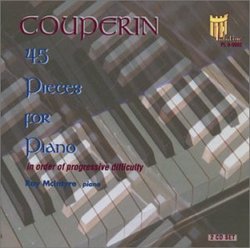| All Artists: Francois Couperin, Ray McIntyre Title: Couperin: 45 Pieces for Piano Members Wishing: 0 Total Copies: 0 Label: Palatine Recordings Original Release Date: 11/1/2000 Release Date: 11/1/2000 Genres: Pop, Classical Styles: Vocal Pop, Ballets & Dances, Baroque Dance Suites, Chamber Music, Forms & Genres, Short Forms, Suites, Historical Periods, Baroque (c.1600-1750), Classical (c.1770-1830), Instruments, Keyboard Number of Discs: 2 SwapaCD Credits: 2 UPC: 689809000222 |
Search - Francois Couperin, Ray McIntyre :: Couperin: 45 Pieces for Piano
 | Francois Couperin, Ray McIntyre Couperin: 45 Pieces for Piano Genres: Pop, Classical
Ray McIntyre has been playing the 216 pieces of Couperin on harpsichord and piano for over fifty years, but in all that time, little effort has been made to render them on the modern piano. In teaching at the Vienna Conse... more » |
Larger Image |
CD DetailsSynopsis
Album Description Ray McIntyre has been playing the 216 pieces of Couperin on harpsichord and piano for over fifty years, but in all that time, little effort has been made to render them on the modern piano. In teaching at the Vienna Conservatory for fourteen years and availing himself of Europe's plentiful libraries and archives, Mr. McIntyre offers an unique perspective on 18th century performance practice. He demonstrates that Couperin's Pièces de Clavecin become universal keyboard works when the elements of style, touch, articulation, note inequality, the treatment of silences and ornaments are understood. Similar CDs
|
CD ReviewsMelodious, Charming, Fascinating J Scott Morrison | Middlebury VT, USA | 06/24/2006 (5 out of 5 stars) "I know next to nothing about the keyboard music of François Couperin. When I was a kid pianist I ran across some pieces by him, tried them, got my fingers snagged on the ever-present ornaments and never went back to them. Over the years I have heard bits and bobs of his keyboard works but never really put much effort into knowing more about them. When this 2CD collection came my way I was ready, apparently, to learn more. Fortunately, Ray McIntyre, the pianist/harpsichordist here, wrote very informative booklet notes. Indeed, he indicates that one of his purposes with this set was 'to introduce the intermediate student of the piano or of the harpsichord ... to the challenge of learning fundamental techniques of keyboard performance from the works of a poorly understood master who stood at the beginning of our modern era, systemized an aesthetic method, introduced the concept of studying etudes, revolutionized the appearance of engraved folios of music and founded the genre of the composer-pianist ... [but] the general music lover need not absorb the didactic detail presented in these notes in order to revel in the passion and tenderness of these pieces.'
McIntyre arranged these forty-five short pieces, taken from the more than 200 Couperin wrote, in order of increasing difficulty. All of them present technical difficulties if only because of those ornaments I mentioned. But as we traverse the collection it is clear that textures become denser, tempi quicker and the necessity for differentiation of touch more insistent. McIntyre's playing demonstrates how it should be done. But more important to the casual listener is the impact of the music itself. These are brief pieces -- interestingly no timings are listed -- that charm with their melodies, their almost conversational impact; it is as if each piece is describing a scene. The titles of the individual pieces help with that -- 'The Bees'; 'Cupid's Fatal Arrows'; 'The Little Windmills'; 'The Convalescent'; 'The Carillon at Cythera'; 'The Nightingale in Love,' etc. The final piece, the longest of the collection, called 'Triumph' is in the form ABACADA and depicts preparing for battle, a fanfare, combat, 'joy of the victors.' Most of the pieces are played on a Blüthner piano whose treble has special tuning: a fourth string for each note in the treble is set to vibrate sympathetically at either 4' or 8' pitch, similar to the tuning of a harpsichord. The result is an exceedingly sweet-toned piano sound that is somewhere between a modern piano and a harpsichord. A couple of pieces are played on piano and then on harpsichord, showing interesting contrast. McIntyre is a sensitive player. At first I felt his performance suffered from tempo instability until I realized that he was responding to the emotional needs of each piece as well as the necessity of giving the often extraordinarily complex ornaments their due. As I became used to this the music took on a more deeply-felt tone that made listening to them more pleasurable. As McIntyre says in his notes, the complexity of the music itself is not immediately perceived by the casual listener because they are beguiled by the charm of Couperin's melodic skill, and that certainly is true. So, this is music the repays both casual and more attentive listening, one of the hallmarks of greatness. Recommended. 2CDs: 147+mins Scott Morrison" |

 Track Listings (30) - Disc #1
Track Listings (30) - Disc #1
